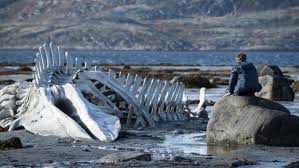Review: Oscar-Nominated Russian Film "Leviathan" -- Man vs. System

One of the most enduring Russian film characters is Gosha, the male lead of Moscow Doesn’t Believe in Tears, an epic melodrama that won the Best Foreign Language Film Oscar in 1980. Gosha is the impossible man: a free person in unfree times. He is an intellectual who works at a research institute, but as a mechanic; because he works with his hands, he is free of the ideological meddling that renders the academic staff helpless and hopeless. He is Hollywood-level handsome, articulate, and well-dressed. Men and women love him, but no one owns him. He drinks—but usually in moderation. He can get into a fight but without damaging his good looks.
Gosha has been emulated by at least two generations of Russian men. Billionaire Mikhail Prokhorov told me in an interview a few years ago that to him Gosha was the epitome of the Russian dream. Gosha is so much the Soviet superman that he is not even Soviet, which is probably what made the Soviet culture ministry at the time suspect that the film’s director, Vladimir Menshov, was not entirely ideologically reliable and prevent him from traveling to the United States for the Academy Award ceremony. Menshov learned of his victory by telegram. According to film lore, he telegraphed back, “MOSCOW DOESN’T BELIEVE STOP IN TEARS STOP.”
Forty-four years later, Menshov is a fervent supporter of Russian President Vladimir Putin and the chairman of Russia’s Oscar nominating committee. The film that Menshov and his committee has selected for this year’s Russian submission to the Academy’s foreign-language category is Andrey Zvyagintsev’s Leviathan, which revisits the character of the Russian man who has managed to live on his own terms. Kolya is a car mechanic—he works for himself, sets his own schedule, and reserves the right to refuse service to anyone. In one of the film’s early scenes, he says no to a senior police officer who needs his car repaired; it takes the officer a few difficult moments to understand he lacks the power to control this situation. “He didn’t like that,” Kolya observes calmly as the officer walks away. Kolya, who is played by Russian movie star Aleksey Serebryakov, is movie-star handsome. His wife is younger and beautiful, and his teenage son adores him. All men want to be his friend.
Kolya also has something that no other Russian has: a beautiful home that has been in his family for generations. This is an asset as impossible as the freedom Menshov ascribed to his character Gosha. For seventy years the Soviet state did not recognize private property, except in cases of extreme privilege or extraordinary, slip-through-the-cracks, stay-below-the-radar luck. That such luck would have persisted for as long as it apparently has in Kolya’s case—his grandfather and his father lived in the house before him—is simply inconceivable, so what sits at the center of the film is the assumption of a miracle. The house is filled with light and with solid beautiful furniture, and offers something that has been at a premium as long as any Russian or his grandparents have been alive—the space to live together with dignity. But now the state, or rather the mayor of Kolya’s town, who is an embodiment of the contemporary corrupt Russian state, wants to take the house, raze it, and build something on the land. Kolya is convinced the mayor is planning “a palace,” meaning a gaudy confection with shades of medieval castle and dollhouse of the sort the Russian rich love. The reality is more sinister still.
The film is riveting, visually and dramatically. It is also precise about Russia: the corruption, inequality, and ultimate hopelessness that drive the plot of Leviathan are becoming only more evident and pronounced in the current meltdown of the economy. Vladimir Putin himself, in an effort to reassure the nation of his hold on power in his annual press conference this month, claimed that Russian authorities “have no palaces.”
Leviathan was shot in the Russian Arctic, on one of the vast stretches of seaside that can look either breathtaking or desperate, depending on the take. It begins with a scene familiar to any Russian who has ever waged—and lost—a battle with the bureaucracy. A blond female judge in a black robe with a white bow, flanked by two clones, reads, in supersonic-speed monotone, the court’s decision to take Kolya’s land away from him. Later the same day, as Kolya and his friend and lawyer Dmitri (Vladimir Vdovichenkov) drown their sorrows in vodka, the mayor, who has been drinking to his victory, pulls up at Kolya’s house. He stands at the porch, backed by his henchmen, and shouts, “You don’t have any rights, you never had any rights, and you will never have any rights!”—among other things, interspersed with the usual Russian curse words.

The film is not subtle. The bad guys—the trinity of the government, the court, and the church—are pure evil. They are Leviathan itself, the Biblical monster that cannot be caught or tamed or killed. The good guys—Kolya and his wife (Elena Liadova) and their friends (Dmitri, and a married couple played by Anna Ukolova and Aleksey Rozin, the mirrors of the three friends of Job)—are good. Their love for one another, their friendship, and their ability to forgive are all genuine. And the outcome is preordained: the good guys will fight and lose.
“What, are you two going to fight the entire city?” Kolya’s wife asks as he and Dmitri begin their battle.
“What, are these creeps the entire city now?” Kolya replies.
“Kolya, don’t pretend that you don’t know what I’m talking about.” Not a minute later, Kolya is arrested. Not only is the good guys’ loss preordained but so is the outcome of every single episode. The worst thing that can happen, will. All that is beautiful will be destroyed. What little personal freedom and private space survived Soviet totalitarianism and post-Soviet lawlessness will be stamped out in the new Russian Dark Age.
This certainty itself is the film’s subject. For fifty-year-old Zvyagintsev, this is a logical step in his progression as a director who has made the prevailing mood of his country the object of his exploration. His The Return (Best Director’s Debut at Venice in 2003) and The Banishment (Best Actor at Cannes for Konstantin Lavronenko in 2007) were open-ended, moody films about anxiety and the condition of constant not-knowing. His 2011 film Elena (which took the Sundance/NHK International Film Makers Award) was a short and pointed attack on one of oil-boom Russia’s most potent myths: that bablo pobezhdaet zlo—“money overpowers evil.” Money, Zvyagintsev appeared to argue, calls forward evil. Leviathan, shot when the boom had ended but the bust was not yet as obscenely evident as it is today, showcases despair as the only fully justified emotion in contemporary Russia.
Few Russians have seen Leviathan. Postponed at least twice, it is now slated to open in Russia in February, but with an entirely new soundtrack, cleaned up of all obscenities to comply with the country’s newly puritanical laws (which ban use of obscene language in any media, including products intended for adults only). While the film waits for its theatrical release, the ruble has collapsed, robbing most Russians of half of their assets, and anti-corruption blogger and the country’s best-known opposition politician, Aleksei Navalny, has gone on trial; he is facing up to ten years in prison. In his closing statement in a Moscow court Navalny called the regime “a junta that has stolen everything”—including, as Russian theater-goers know too well, any private house, land, or business any bureaucrat has ever wanted to make his own.
In a recent speech the country’s minister of culture made a reference to the film without naming it, calling its genre “films about ‘Russia the shithole.’” So why did Russia support its nomination? Vladimir Menshov, the head of the Oscar nominating committee, opposed Leviathan’s candidacy. “It’s a very strong work,” he has said, “but it is difficult. We all base our impression of a country on its films. If foreigners view this picture, they’ll get the impression that that’s the kind of vileness we live in. The film is so hopeless!” If Menshov noticed Zvyagintsev’s subtle homage to the great character of Menshov’s creation, then he also probably noticed that the younger director in the course of the movie takes away the character’s greatest assets: personal freedom and hope. On the other hand, many Russians—including, evidently, the minister of culture—believe that foreigners, or at least Americans, already see Russian life precisely as vile and desperate, and that this view is unfair. So the vote for Leviathan plays, at least in part, to the American Academy’s presumed confirmation bias: Go ahead, the nominating committee is saying, give your decadent award to a movie that shows Russia the way you Americans view it anyway.
And then there is another issue with the Oscars: How desirable could this recognition be in a country that views itself as being at war with the United States (by proxy of Ukraine)? Two other possible leading contenders, powerful directors Andron Konchalovsky and his brother Nikita Mikhalkov, who has won multiple Academy Awards, pulled their own films out of the nominating process. Konchalovsky explained that he did not want any Hollywood handouts. If Zvyagintsev does get the Academy Award, he will likely be condemned for it at home, by the media and the ministry of culture—in a sad echo of Menshov’s own experience in 1980.
In their infinite cynicism, the Russian selectors have probably overestimated Americans’ ability to imagine the depth of Russia’s despair. What keeps the viewer glued to the screen for 141 minutes of unambiguous characters against a sparse landscape are the very fine details and vagaries of Russian misfortune. Just how will things become as bad as they are clearly fated to become?
The viewer does not need to know anything about Russia to follow the drama of the little man fighting the System. Those with a little Russia knowledge will be able to catch references to recent political events. About halfway through the film, a blurry-gray television screen shows graffiti that appears to be part of a newscast; it says PUSSY RIOT. And at the very end, another reference to the protest-art group comes in an on-screen sermon: “When blasphemy is called a prayer,” says the priest, referring to Pussy Riot’s “Punk Prayer,” a protest in a Moscow cathedral for which three members were sentenced to two years in jail, “that constitutes the destruction of truth.” The film continues the conversation Pussy Riot started in 2012. The group screamed in protest against the symbiosis of church and state, and this landed its members in jail. Now Dmitri, the lawyer, is trying to fight the church-court-state machine with facts. Dmitri does not believe in God, revelations, or confessions of any sort. He places his faith in facts only.
With Kolya in jail, Dmtri goes to see the mayor. He has the facts about the mayor’s own past crimes—and he is certain he can blackmail him into obeying the law. Such is the power of facts. The mayor is indeed scared for a second.
“What do you want?” he asks.
“I want Nikolay to keep what’s his,” says the lawyer.
“Oh, but that is impossible,” responds the bureaucrat, and the clarity of this statement appears to set him at ease.
This scene occurs early on in the movie, and from this moment we know how it will all end. Facts are helpless before Truth—and the Russian Leviathan has a monopoly on the truth.
Leviathan is currently playing in New York City at the Film Forum and the Lincoln Plaza Cinema and at many other theaters around the country.
Masha Gessen is the author of The Man Without a Face: The Unlikely Rise of Vladimir Putin. Her latest book, Words Will Break Cement: The Passion of Pussy Riot, was published in January. (May 2014)
